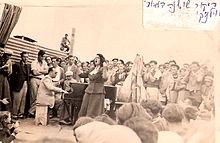- Moshe Vilenski
-
Moshe Vilenski 
Moshe Vilenski playing piano, entertaining people in DP camps in Cyprus (ca. 1947–48)Born April 17, 1910
Warsaw, PolandDied January 2, 1997 Nationality Israeli Alma mater Warsaw Conservatory Notable works Songs: "Kalaniyot" ("Anemones"), "Hayu Zmanim" ("In Those Times)", "Autumn," "Ring Twice and Wait," "Each Day I Lose," "The Last Battle", and "Mul Har Sinai" ("Opposite Mt. Sinai") Religion Jewish Awards Israel Prize Moshe Vilenski (Hebrew: משה וילנסקי, also, "Vilenksy" and "Wilensky"; April 17, 1910 – January 2, 1997) was an Israeli composer, lyricist, and pianist.[1][2][3][4][5][6][7][8] He is considered a "pioneer of Israeli song", and one of Israel's leading composers, and was a winner of the Israel Prize, the state's highest honor.[9][10]
Contents
Early life
Vilenski, who was Jewish, was born in Warsaw, Poland, the son of Zelig and Henia (née Liebman).[1][11][12] He studied music at the Warsaw Conservatory in Warsaw, specializing in conducting and composition, and immigrated to Palestine in 1932.[1][4][11] He married Bertha Yakimovska in 1939.[12]
Music career
Vilenski worked in theaters as a pianist. He became a composer and lyricist for theaters and for musical troupes of the Israel Defense Forces, including the Nahal choir in the 1950s.[13] He also composed for films, plays, hora dances, cabaret songs, and nursery children's tunes.[1][3][4][14][15] He was in charge of the Israel Radio orchestra, and wrote nearly 1,500 songs from the 1930s through the 1980s.[1][4]
Vilenski's music combines Slavic music and Eastern music.[1] Many of Natan Alterman's poems were set to his music.[1] He is known especially for his work with Shoshana Damari.[1][2][4][5] Among his songs are "Kalaniyot" ("Anemones"), "Hayu Zmanim" ("In Those Times)", "Autumn," "Ring Twice and Wait," "Each Day I Lose," "The Last Battle", and "Mul Har Sinai" ("Opposite Mt. Sinai").[1][2][10][16][17][18]
In 1962, Israeli Esther Reichstadt won second prize at the Polish international song festival with Vilenski's song "Autumn".[19]
In 1983, Vilenski was awarded the Israel Prize, for Hebrew song (melody).[1][20] In 1990, a special concert in honor of his 80th birthday was given by the Israel Philharmonic Orchestra.[10] In 1998, the Israel Association of Composers, Authors and Publishers (ACUM) named its Song of the Year Award the "Moshe Wilensky Prize".[21]
In 2005, Vilenski was voted the 187th-greatest Israeli of all time, in a poll by the Israeli news website Ynet to determine whom the general public considered the 200 Greatest Israelis.[22]
See also
References
- ^ a b c d e f g h i j "Moshe Vilensky". Jewishvirtuallibrary.org. http://www.jewishvirtuallibrary.org/jsource/biography/Vilensky.html. Retrieved July 31, 2011.
- ^ a b c Dan Baron (February 23, 2006). "Shoshana Damari, 83". The Jewish Exponent. http://www.jewishexponent.com/article/2585/Shoshana_Damari_83/. Retrieved July 31, 2011.
- ^ a b Penn, Lea (July 22, 2011). "All keyed up". Haaretz. http://www.haaretz.com/weekend/week-s-end/all-keyed-up-1.309194. Retrieved July 31, 2011.
- ^ a b c d e Hirschfeld, Ariel (Julyt 30, 2010). "All hail the king". Haaretz. http://www.haaretz.com/weekend/magazine/all-hail-the-king-1.304956. Retrieved July 31, 2011.
- ^ a b R. P. (April 14, 1952). "ISRAELI SINGER HEARD BY 1,500 AT TOWN HALL". The New York Times. http://select.nytimes.com/gst/abstract.html?res=F1071EFE3C5E177B93C6A8178FD85F468585F9. Retrieved July 31, 2011.
- ^ "Zionists Plan Cultural Fete". The Miami News. November 24, 1951. http://news.google.com/newspapers?id=FZIzAAAAIBAJ&sjid=XekFAAAAIBAJ&pg=4568,4341338&dq=moshe+wilensky&hl=en. Retrieved July 31, 2011.
- ^ Jascha Nemtsov (2009). Der Zionismus in der Musik: Jüdische Musik und nationale Idee. http://books.google.com/books?id=M89WcFicMGAC&pg=PA193&dq=Moshe+Wilensky&hl=en&ei=ltY1TqDVB8a30AG-hYXkCw&sa=X&oi=book_result&ct=result&resnum=10&ved=0CFoQ6AEwCQ#v=onepage&q=Moshe%20Wilensky&f=false. Retrieved July 31, 2011.
- ^ P. Mamut (1965). Who's who, Israel. http://books.google.com/books?id=F2tAAQAAIAAJ&q=Moshe+wilensky+%22april+17,+1910%22&dq=Moshe+wilensky+%22april+17,+1910%22&hl=en&ei=UfE2TuDSFeLb0QGX65T0Cw&sa=X&oi=book_result&ct=result&resnum=1&ved=0CCkQ6AEwAA. Retrieved August 1, 2011.
- ^ Schweitzer, Erez (July 22, 2011). "And the twain shall meet". Haaretz. http://www.haaretz.com/and-the-twain-shall-meet-1.2848. Retrieved July 31, 2011.
- ^ a b c Michael Ajsenstadt (January 5, 2000). "Moshe Wilensky – shaping the national soul". The Jerusalem Post. http://pqasb.pqarchiver.com/jpost/access/47726510.html?dids=47726510:47726510&FMT=ABS&FMTS=ABS:FT&date=Jan+05%2C+2000&author=MICHAEL+AJZENSTADT&pub=Jerusalem+Post&desc=Moshe+Wilensky+-+shaping+the+national+soul&pqatl=google. Retrieved July 31, 2011.
- ^ a b Marsha Bryan Edelman (2003). Discovering Jewish music. http://books.google.com/books?id=VuOZAJzvzOQC&pg=PA323&dq=Moshe+Wilensky&hl=en&ei=ltY1TqDVB8a30AG-hYXkCw&sa=X&oi=book_result&ct=result&resnum=3&ved=0CDoQ6AEwAg#v=onepage&q=Moshe%20Wilensky&f=false. Retrieved July 31, 2011.
- ^ a b Harry Schneiderman, Itzhak J. Carmin (1978). Who's who in world Jewry. http://books.google.com/books?id=zXNqAAAAMAAJ&q=Moshe+wilensky+%22april+17,+1910%22&dq=Moshe+wilensky+%22april+17,+1910%22&hl=en&ei=UfE2TuDSFeLb0QGX65T0Cw&sa=X&oi=book_result&ct=result&resnum=2&ved=0CCwQ6AEwAQ. Retrieved August 1, 2011.
- ^ Handelzalts, Michael (July 22, 2011). "In the shadow of the cannons". Haaretz. http://www.haaretz.com/print-edition/opinion/in-the-shadow-of-the-cannons-1.204914. Retrieved July 31, 2011.
- ^ Amy Kronish, Costel Safirman (2003). Israeli film: a reference guide. http://books.google.com/books?id=BJsktgkY9boC&pg=PA116&dq=Moshe+Wilensky&hl=en&ei=ltY1TqDVB8a30AG-hYXkCw&sa=X&oi=book_result&ct=result&resnum=2&ved=0CDQQ6AEwAQ#v=onepage&q=Moshe%20Wilensky&f=false. Retrieved July 31, 2011.
- ^ Oliver Leaman (2001). Companion encyclopedia of Middle Eastern and North African film. http://books.google.com/books?id=hP16fBJ06yUC&pg=PA246&dq=Moshe+Wilensky&hl=en&ei=ltY1TqDVB8a30AG-hYXkCw&sa=X&oi=book_result&ct=result&resnum=8&ved=0CFAQ6AEwBw#v=onepage&q=Moshe%20Wilensky&f=false. Retrieved July 31, 2011.
- ^ Selwyn Ilan Troen, Noah Lucas (1995). Israel: the first decade of independence. http://books.google.com/books?id=1Z73ADzNJAMC&pg=PA371&dq=Moshe+Vilenski&hl=en&ei=TL81TsS-JMzq0QHptLWADA&sa=X&oi=book_result&ct=result&resnum=1&ved=0CCsQ6AEwAA#v=onepage&q=Moshe%20Vilenski&f=false. Retrieved July 31, 2011.
- ^ Zohar, Itamar (August 20, 2010). "Sublime experience". Haaretz. http://www.haaretz.com/weekend/magazine/sublime-experience-1.309225. Retrieved July 31, 2011.
- ^ Jack Gottlieb (2004). Funny, it doesn't sound Jewish: how Yiddish songs and synagogue melodies influenced Tin Pan Alley, Broadway, and Hollywood. SUNY Press. http://books.google.com/books?id=-jQzZfNYKWsC&pg=PA171&dq=Moshe+Wilensky&hl=en&ei=ltY1TqDVB8a30AG-hYXkCw&sa=X&oi=book_result&ct=result&resnum=7&ved=0CEsQ6AEwBg#v=onepage&q=Moshe%20Wilensky&f=false. Retrieved July 31, 2011.
- ^ Handelzalts, Michael (June 7, 2007). "Comfortable in her own skin". Haaretz. http://www.haaretz.com/weekend/magazine/comfortable-in-her-own-skin-1.222585. Retrieved July 31, 2011.
- ^ "Israel Prize Official Site – Recipients in 1983 (in Hebrew)". http://cms.education.gov.il/EducationCMS/Units/PrasIsrael/Tashmag/Tashnab_Tashmag_Rikuz.htm?DictionaryKey=Tashmag.
- ^ Helen Kaye (January 1, 1998). "And the winners are ...". The Jerusalem Post. http://pqasb.pqarchiver.com/jpost/access/25160490.html?dids=25160490:25160490&FMT=ABS&FMTS=ABS:FT&date=Jan+01%2C+1998&author=Helen+Kaye&pub=Jerusalem+Post&desc=And+the+winners+are..&pqatl=google. Retrieved July 31, 2011.
- ^ גיא בניוביץ' (June 20, 1995). "הישראלי מספר 1: יצחק רבין – תרבות ובידור". Ynet. http://www.ynet.co.il/articles/0,7340,L-3083171,00.html. Retrieved July 10, 2011.
External links
Categories:- 1910 births
- 1997 deaths
- Composers in the Palestine mandate
- Israeli composers
- Israeli lyricists
- Israeli pianists
- Israel Prize in Hebrew song recipients
- Polish emigrants to Israel
- Fryderyk Chopin University of Music in Warsaw alumni
- Jewish composers
- Jewish musicians
- Polish composers
- Polish pianists
- Polish Jews
- People from Warsaw
Wikimedia Foundation. 2010.
